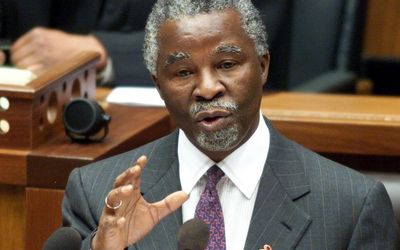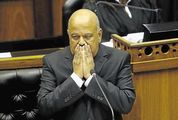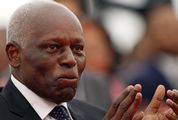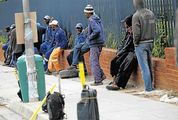IMAGINE if former president Thabo Mbeki had announced that he’d reflected on his stance on HIV/AIDS during his term of office and that while he’d done what he believed was best for the country at the time, with hindsight, he’d got it wrong and he was sorry.
SA would have taken another step forward in tackling one of the saddest chapters in its postapartheid history and Mr Mbeki would have gone a long way towards repairing his tarnished legacy.
Alas, this is not what has happened. Mr Mbeki has never taken responsibility for any of his administration’s failings, dismissing them as "a gross distortion of our history". And then on Monday, he fired off his latest missive to dispel supposed misperceptions about the past, and nailed his colours to the HIV/AIDS dissident mast more firmly than ever before.
Lest we forget, Mr Mbeki and his lackeys promoted quackery over the well-established science that supported antiretroviral (ARV) treatment for HIV/AIDS patients. His health minister, Manto Tshabalala-Msimang, went further, portraying the drugs as poisonous and advocating nutrition and an untested remedy based on garlic, lemons and olive oil in their place.
Mr Mbeki reflects on three main points. Firstly, he denies ever saying HIV doesn’t cause AIDS, only that a virus (HIV) cannot cause a syndrome.
Mr Mbeki is simply wrong: viruses can cause syndromes. HIV is just one example. So too is severe acute respiratory syndrome, or Sars, a respiratory illness caused by a virus.
Secondly, Mr Mbeki says HIV/AIDS was only the ninth leading cause of death in 2006, and was therefore not deserving of the focus it received. This too is rubbish. HIV/AIDS stigma ran so deep in SA at the time that the disease was underreported as the cause of death. The three most recent reports from Statistics SA identify HIV/AIDS and tuberculosis as the two leading causes of death. These "evil twins" are inextricably linked, each making patients more vulnerable to the other.
Thirdly, Mr Mbeki suggests all the international "noise" about HIV/AIDS was because SA was a potentially lucrative market for pharmaceutical companies selling ARVs. While there may be some merit to the argument that drug companies’ profits are boosted by new markets for their products, that doesn’t dispel the fact that the drugs save lives.
Mr Mbeki also informs us he was an author of an anonymous document written in 2002 entitled "Castro Hlongwane, Caravans, Cats, Geese, Foot and Mouth and Statistics", a diatribe against what it calls "the thesis of HIV/AIDS". Bizarre and incoherent as it seems to many people who have since read it, it had a huge and damaging influence in the government.
The numbers speak for themselves. Under Mr Mbeki’s watch SA’s HIV/AIDS epidemic became one of the world’s worst. A Harvard study showed 330,000 people died unnecessarily between 2000 and 2005, and life expectancy plummeted to a low of 53 years by 2005.
Although SA began providing HIV/AIDS treatment in 2004, it expanded access with any real energy only after Mr Mbeki was unceremoniously removed from office. The nation is still paying the price for his folly. By 2014, an estimated 6.8-million people were HIV-infected, and by the end of last year, 3.25-million people were on treatment.
SA now boasts the world’s biggest treatment programme and while the prices the country pays for drugs are among the lowest, the sheer scale of the programme means it takes a considerable share of the health budget.
Mr Mbeki’s attempt to rewrite history is likely to be viewed with as much scepticism as his misdirected approach towards tackling HIV/AIDS. He likes to portray himself as a deep thinker. But there’s no evidence in his letter of any meaningful reflection.

Thabo Mbeki. Picture: REUTERS
IMAGINE if former president Thabo Mbeki had announced that he’d reflected on his stance on HIV/AIDS during his term of office and that while he’d done what he believed was best for the country at the time, with hindsight, he’d got it wrong and he was sorry.
SA would have taken another step forward in tackling one of the saddest chapters in its postapartheid history and Mr Mbeki would have gone a long way towards repairing his tarnished legacy.
Alas, this is not what has happened. Mr Mbeki has never taken responsibility for any of his administration’s failings, dismissing them as "a gross distortion of our history". And then on Monday, he fired off his latest missive to dispel supposed misperceptions about the past, and nailed his colours to the HIV/AIDS dissident mast more firmly than ever before.
Lest we forget, Mr Mbeki and his lackeys promoted quackery over the well-established science that supported antiretroviral (ARV) treatment for HIV/AIDS patients. His health minister, Manto Tshabalala-Msimang, went further, portraying the drugs as poisonous and advocating nutrition and an untested remedy based on garlic, lemons and olive oil in their place.
Mr Mbeki reflects on three main points. Firstly, he denies ever saying HIV doesn’t cause AIDS, only that a virus (HIV) cannot cause a syndrome.
Mr Mbeki is simply wrong: viruses can cause syndromes. HIV is just one example. So too is severe acute respiratory syndrome, or Sars, a respiratory illness caused by a virus.
Secondly, Mr Mbeki says HIV/AIDS was only the ninth leading cause of death in 2006, and was therefore not deserving of the focus it received. This too is rubbish. HIV/AIDS stigma ran so deep in SA at the time that the disease was underreported as the cause of death. The three most recent reports from Statistics SA identify HIV/AIDS and tuberculosis as the two leading causes of death. These "evil twins" are inextricably linked, each making patients more vulnerable to the other.
Thirdly, Mr Mbeki suggests all the international "noise" about HIV/AIDS was because SA was a potentially lucrative market for pharmaceutical companies selling ARVs. While there may be some merit to the argument that drug companies’ profits are boosted by new markets for their products, that doesn’t dispel the fact that the drugs save lives.
Mr Mbeki also informs us he was an author of an anonymous document written in 2002 entitled "Castro Hlongwane, Caravans, Cats, Geese, Foot and Mouth and Statistics", a diatribe against what it calls "the thesis of HIV/AIDS". Bizarre and incoherent as it seems to many people who have since read it, it had a huge and damaging influence in the government.
The numbers speak for themselves. Under Mr Mbeki’s watch SA’s HIV/AIDS epidemic became one of the world’s worst. A Harvard study showed 330,000 people died unnecessarily between 2000 and 2005, and life expectancy plummeted to a low of 53 years by 2005.
Although SA began providing HIV/AIDS treatment in 2004, it expanded access with any real energy only after Mr Mbeki was unceremoniously removed from office. The nation is still paying the price for his folly. By 2014, an estimated 6.8-million people were HIV-infected, and by the end of last year, 3.25-million people were on treatment.
SA now boasts the world’s biggest treatment programme and while the prices the country pays for drugs are among the lowest, the sheer scale of the programme means it takes a considerable share of the health budget.
Mr Mbeki’s attempt to rewrite history is likely to be viewed with as much scepticism as his misdirected approach towards tackling HIV/AIDS. He likes to portray himself as a deep thinker. But there’s no evidence in his letter of any meaningful reflection.





















Change: 0.40%
Change: 0.47%
Change: -0.49%
Change: 0.53%
Change: 1.03%
Data supplied by Profile Data
Change: 1.71%
Change: 1.28%
Change: 0.40%
Change: 0.00%
Change: 1.64%
Data supplied by Profile Data
Change: -1.27%
Change: 0.00%
Change: 0.05%
Change: -0.08%
Change: 0.35%
Data supplied by Profile Data
Change: -0.02%
Change: 0.21%
Change: -0.06%
Change: 0.53%
Change: 0.70%
Data supplied by Profile Data